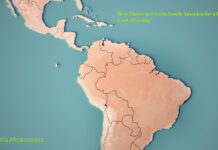
How China and the USA Are Competing for Africa’s Market
1. Why Africa Matters
Africa is home to over 1.4 billion people and some of the world’s fastest-growing economies.
With massive reserves of oil, gold, lithium, and agricultural land, it’s no surprise that global powers see the continent as the next big frontier for investment and influence.
But this isn’t just about natural resources — Africa also has a rising middle class, increasing internet connectivity, and a youthful population driving innovation and entrepreneurship.
2. China’s Strategy: Infrastructure and Investment
Over the past two decades, China has become Africa’s largest trading partner.
Through its Belt and Road Initiative (BRI), China has funded and built railways, highways, airports, and power plants across dozens of African nations.
Countries like Kenya, Ethiopia, and Nigeria have benefited from massive infrastructure projects — improving trade routes and energy access.
But while China offers fast funding with fewer political conditions, critics warn that its loans could lead to debt dependency, giving Beijing too much control over Africa’s long-term economic policies.
Still, for many African governments, China’s “no-strings-attached” approach is seen as more flexible and practical than traditional Western aid.
3. The U.S. Response: Trade, Innovation, and Governance
In response, the United States has been working to rebuild its economic and diplomatic influence across Africa.
Through programs like Prosper Africa and the U.S.-Africa Leaders Summit, Washington promotes entrepreneurship, digital infrastructure, and renewable energy investments.
American companies like Google, Microsoft, and Tesla are entering African markets with projects focused on digital skills, startups, and clean energy.
The U.S. also emphasizes transparency, governance, and human rights in its partnerships — positioning itself as a promoter of sustainable, people-centered development.
However, these requirements sometimes make American investment slower to deliver, especially when compared to China’s rapid funding and construction pace.
4. The Battle for Influence
While China invests heavily in infrastructure and trade, the U.S. focuses on technology, education, and private-sector growth.
This difference in approach reflects their larger global strategies:
China aims to integrate African economies into its supply chains, while the U.S. wants to strengthen democratic institutions and promote long-term stability.
African nations, meanwhile, are not simply passive participants.
Many are adopting a balanced or multi-alignment approach, partnering with both powers to secure the best of both worlds — infrastructure from China and innovation from the U.S.
5. The Future of Africa’s Global Role
As global power dynamics evolve, Africa’s importance continues to grow.
By 2050, the continent’s population is expected to double, and its cities will drive some of the fastest GDP growth in the world.
This makes Africa not just a market to be won, but a strategic partner shaping the future of global trade and politics. RECOMMENDED: Top 10 African Cities with the Best Nightlife.
Both China and the U.S. understand this — and their competition will likely intensify in areas like technology, green energy, and security.
For African nations, the real opportunity lies in using this rivalry to build a stronger, more self-reliant future.
Conclusion about How China and the USA Are Competing for Africa’s Market
The competition between China and the United States in Africa isn’t just about influence — it’s about the future of global power. Africa’s leaders are no longer choosing sides; they’re choosing strategies that work best for their people. And as both superpowers continue to invest, the continent has a chance to rise as a central player in the 21st-century world economy.















